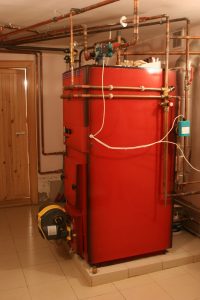Winters in Portland, OR mean that you need a reliable heating system to keep the cold at bay. For most homes, that means a furnace, which generates heated air and then moves it through your home (typically with a system of ducts). Furnaces come in a variety of styles but typically consist of two basic models: gas or electric. If you’re in the market for a new furnace, either now or in the spring, it helps to understand the difference between them – and what that means for your home.
Gas Or Electric Furnace
While both types of furnaces work to heat your home’s air through the ducts, there is a key difference. Gas-powered furnaces use burners fed by natural gas, and electric-powered furnaces rely on heated coils. They each have tangible benefits and drawbacks, and the model that works best for your home may vary depending on a number of factors.

Gas Furnaces
Pros
- Gas costs less than electricity, which means they can save you a great deal on month-to-month costs over electric furnaces.
- They also heat the air more quickly on average than electric furnaces, and they do their jobs better on very cold days than electric furnaces. That’s no small consideration when cold fronts start to hit.
Cons
- Gas furnaces typically rely on natural gas piped in from a civic source, which means a more elaborate set-up since they need to be connected to gas piping and the like.
- They tend to cost more to install than electric furnaces.
- Gas furnaces also generate more wear and tear on average, which means they don’t last quite as long and are more prone to repair issues and breakdowns than electric systems.
- Finally, carbon monoxide and other gasses are created when gas furnaces operate, and while they are built to remove those gasses safely from your home, there’s still a small risk.
Electric Furnaces
Pros
- Electric furnaces make a great fit for homes without access to the civic gas lines since they connect to your home’s electrical grid and receive the power that way.
- They also cost less to install, since gas lines aren’t a factor.
- There’s no risk of carbon monoxide, and because electric furnaces undergo less stress and strain, they don’t require servicing as often.
- They also tend to last longer than gas furnaces, giving you more service for your initial investment.
Cons
- Electric furnaces cost more to run from month to month than gas furnaces, and over time, that can negate the financial advantages of purchasing a less expensive unit.
- There’s also the question of efficiency, since electric furnaces take longer to warm your home, and don’t always perform as well when things get very cold.
Which Is Better?
Gas furnaces are better for a home with access to a civic grid, and/or which are occupied for most winters: long-term homes and the like. Electric furnaces tend to do better for rural homes and homes that are occupied only part of the year (such as vacation homes and the like).
If you’re interested in replacing your furnace in the next few months, call the pros at Western Heating & Cooling to discuss your options!

